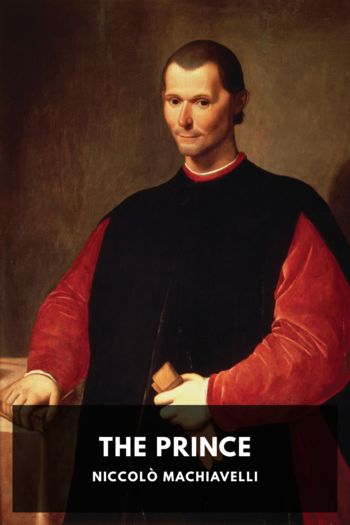The Prince - Niccolò Machiavelli (ebooks online reader txt) 📗

- Author: Niccolò Machiavelli
Book online «The Prince - Niccolò Machiavelli (ebooks online reader txt) 📗». Author Niccolò Machiavelli
When the duke occupied the Romagna he found it under the rule of weak masters, who rather plundered their subjects than ruled them, and gave them more cause for disunion than for union, so that the country was full of robbery, quarrels, and every kind of violence; and so, wishing to bring back peace and obedience to authority, he considered it necessary to give it a good governor. Thereupon he promoted Messer Ramiro d’Orco,11 a swift and cruel man, to whom he gave the fullest power. This man in a short time restored peace and unity with the greatest success. Afterwards the duke considered that it was not advisable to confer such excessive authority, for he had no doubt but that he would become odious, so he set up a court of judgment in the country, under a most excellent president, wherein all cities had their advocates. And because he knew that the past severity had caused some hatred against himself, so, to clear himself in the minds of the people, and gain them entirely to himself, he desired to show that, if any cruelty had been practised, it had not originated with him, but in the natural sternness of the minister. Under this pretence he took Ramiro, and one morning caused him to be executed and left on the piazza at Cesena with the block and a bloody knife at his side. The barbarity of this spectacle caused the people to be at once satisfied and dismayed.
But let us return whence we started. I say that the duke, finding himself now sufficiently powerful and partly secured from immediate dangers by having armed himself in his own way, and having in a great measure crushed those forces in his vicinity that could injure him if he wished to proceed with his conquest, had next to consider France, for he knew that the king, who too late was aware of his mistake, would not support him. And from this time he began to seek new alliances and to temporize with France in the expedition which she was making towards the kingdom of Naples against the Spaniards who were besieging Gaeta. It was his intention to secure himself against them, and this he would have quickly accomplished had Alexander lived.
Such was his line of action as to present affairs. But as to the future he had to fear, in the first place, that a new successor to the Church might not be friendly to him and might seek to take from him that which Alexander had given him, so he decided to act in four ways. Firstly, by exterminating the families of those lords whom he had despoiled, so as to take away that pretext from the Pope. Secondly, by winning to himself all the gentlemen of Rome, so as to be able to curb the Pope with their aid, as has been observed. Thirdly, by converting the college more to himself. Fourthly, by acquiring so much power before the Pope should die that he could by his own measures resist the first shock. Of these four things, at the death of Alexander, he had accomplished three. For he had killed as many of the dispossessed lords as he could lay hands on, and few had escaped; he had won over the Roman gentlemen, and he had the most numerous party in the college. And as to any fresh acquisition, he intended to become master of Tuscany, for he already possessed Perugia and Piombino, and Pisa was under his protection. And as he had no longer to study France (for the French were already driven out of the kingdom of Naples by the Spaniards, and in this way both were compelled to buy his goodwill), he pounced down upon Pisa. After this, Lucca and Siena yielded at once, partly through hatred and partly through fear of the Florentines; and the Florentines would have had no remedy had he continued to prosper, as he was prospering the year that Alexander died, for he had acquired so much power and reputation that he would have stood by himself, and no longer have depended on the luck and the forces of others, but solely on his own power and ability.
But Alexander died five years after he had first drawn the sword. He left the duke with the state of Romagna alone consolidated, with the rest in the air, between two most powerful hostile armies, and sick unto death. Yet there were in the duke such boldness and ability, and he knew so well how men are to be won or lost, and so firm were the foundations which in so short a time he had laid, that if he had not had those armies on his back, or if he had been in good health, he would have overcome all difficulties. And it is seen





Comments (0)